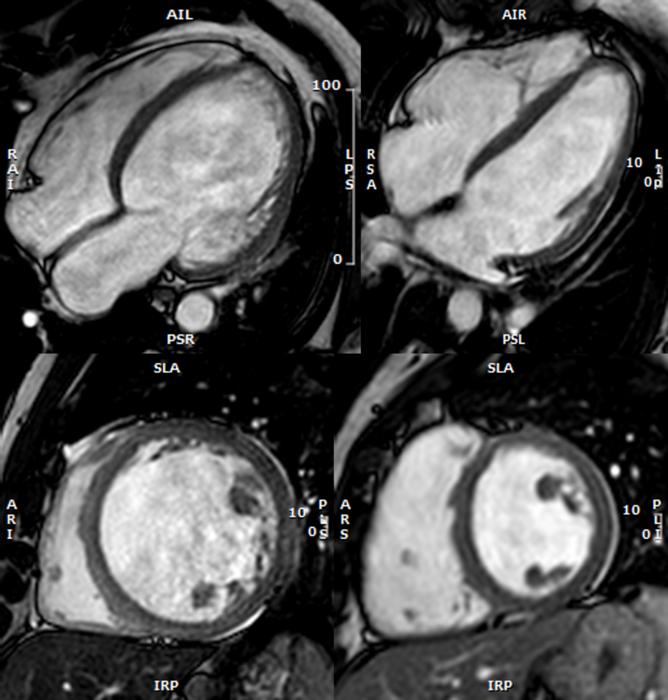Dilated cardiomyopathy is the most frequent cause of heart failure in young people and is the leading cause of heart transplantation. In this disease, the heart enlarges and reduces its capacity to pump blood. People with dilated cardiomyopathy are at high risk for arrhythmias and sudden death.

Credit: CNIC
Dilated cardiomyopathy is the most frequent cause of heart failure in young people and is the leading cause of heart transplantation. In this disease, the heart enlarges and reduces its capacity to pump blood. People with dilated cardiomyopathy are at high risk for arrhythmias and sudden death.
In approximately 30%–40% of people with dilated cardiomyopathy, the disease is caused by a genetic mutation. When a genetic cause is identified, the patient’s family members can be studied to determine if they have also inherited the altered gene.
Family members who are carriers of the genetic mutation are at risk for developing the disease in the future, and it is recommended that they undergo regular check-ups so that any signs of the disease can be detected as soon as they appear and pharmacological treatments initiated.
Nevertheless, it is not known if all family members carrying the culprit mutation will go on to develop the disease, at what age this is more likely to happen, and if there are factors that could help to identify those individuals who are likely to show signs of disease over the short term and who would therefore benefit from closer monitoring.
The new study, led by Dr. Pablo García-Pavía, a researcher at the Centro Nacional de Investigaciones Cardiovasculares (CNIC), a group leader in the Spanish cardiovascular research network (CIBERCV), and a cardiologist at Hospital Puerta de Hierro, provides the first stratification of the risk of developing dilated cardiomyopathy among symptom-free genetic carriers of the disease.
A total of 25 Spanish hospitals participated in the study, which is published in the Journal of the American College of Cardiology. Data were collected from more than 779 genetic carriers, from 300 families, who had shown no signs of the disease before entering the study.
The researchers found that, after a median follow-up of 37 months, almost 11% of the genetic carriers had developed the disease.
The study also showed that the appearance of the disease was dependent on the specific type of genetic mutation present.
Moreover, said Dr. García-Pavía, “we found that patients who develop the disease tended to share certain characteristics, such as older age, electrocardiogram alterations, and an enlarged heart with a weaker pumping action, albeit within the normal range.”
Dr. García-Pavía added that “the risk for developing the disease was also higher in patients with mutations in sarcomere genes or in those whose hearts showed signs of fibrosis detected by magnetic resonance imaging.”
First author of the study, Dr. Eva Cabrera, a cardiologist at Hospital Puerta de Hierro, said “these results will allow us to offer more personalized care to genetic carriers with no disease symptoms.”
Currently, all genetic carriers receive a similar care strategy, consisting of annual or twice-yearly check-ups. “Now,” said Dr. Cabrera, “we can schedule check-ups to meet the specific needs of the individual patient: more spaced out for patients without risk factors, and more frequent for those at higher risk.”
The study was supported by the Sociedad Española de Cardiología (a Hereditary Cardiac Disease grant awarded in 2022) and the Instituto de Salud Carlos III through projects PI18/0004 and PI20/0320 (cofounded by the European Regional Development Fund/European Social Fund “A way to build Europe”/“Investing in your Future”).
About the CNIC
The CNIC is an affiliate center of the Carlos III Health Institute (ISCIII), an executive agency of the Spanish Ministry of Science, Innovation, and Universities. Directed by Dr. Valentín Fuster, the CNIC is dedicated to cardiovascular research and the translation of the knowledge gained into real benefits for patients. The CNIC has been recognized by the Spanish government as a Severo Ochoa center of excellence (award CEX2020-001041-S, funded by MICIN/AEI/10.13039/501100011033). The center is financed through a pioneering public-private partnership between the government (through the ISCIII) and the Pro-CNIC Foundation, which brings together 12 of the most important Spanish private companies.
Journal
Journal of the American College of Cardiology
Method of Research
Observational study
Subject of Research
People
Article Title
Penetrance of Dilated Cardiomyopathy in genotype positive relatives
Article Publication Date
22-Apr-2024



